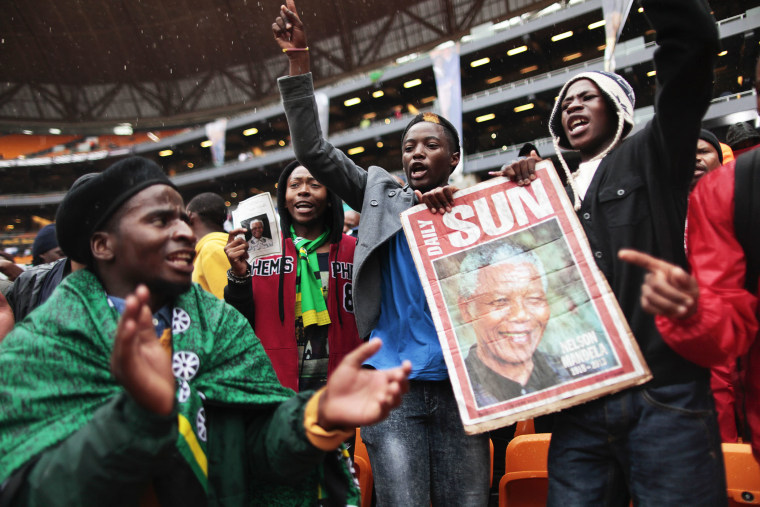Eighty-two-year-old Archbishop Desmond Tutu danced joyously around the stage, accompanied by a thundering gospel choir. Recording artist Peter Gabriel stood in the audience snapping photos on a cell phone like a kid at a rock concert. People were cheering, laughing, singing, and crying. It’s one of those life events that, after the fact, you look back and wonder whether it was real, or just a vivid dream.
I took part in a memorial service for Nelson Mandela, hosted by the Nelson Mandela Foundation in Johannesburg, whose motto is: “Living the Legacy.” And legacy was very much on the minds of two of our seat mates in the audience: Peter Gabriel, and former Irish President Mary Robinson. They talked to us about one of Mandela’s great projects—The Elders—and their fervent hope that a new generation will pick up Mandela’s torch and take on the causes the mattered to him.
My brother, Marc, once asked Mandela his secret of leadership. Mandela’s reply was a simple one, drawn from childhood lessons learned working as a shepherd: “To lead your flock from behind.” As an educational partner inspired by Mandela’s vision, we will share those lessons with the next generation of shameless idealists and ensure the wisdom of this legendary teacher lives on. Over the past 18 years, Free The Children has built 650 schools and school rooms. Every day, we bring education to 55,000 children in communities across Africa and around the globe. Although Marc and I have met Mandela many times, Robinson and Gabriel knew him far better, having been involved with The Elders.
During his keynote remarks, Tutu stopped to point out Robinson and Gabriel, calling on them to stand and be recognized by the audience for the roles they played in helping Mandela bring about the dream of The Elders. Tutu told the story of how, in 1999, Gabriel and Sir Richard Branson got to talking. They noted how traditional cultures around the world, elders play an invaluable role in solving problems and resolving conflicts in their villages. They agreed that an increasingly interconnected global village needed such elders as much as a village in Kenya, and they approached Mandela with the idea. Eight years later, Mandela founded The Elders.
Mary Robinson, who was President of Ireland from 1990 to 1997, United Nations Human Rights Commissioner from 1997 to 2002, and is currently the UN Special Envoy for the Great Lakes region of Africa, is one of those Elders, along with the likes of Former UN Secretary General Kofi Annan and former U.S. President Jimmy Carter. We met Robinson years ago as co-recipients of Four Freedoms awards, and have welcomed her many times since as a speaker at our We Day events. We Day is a movement that empowers young people to become agents of social change through inspirational events. We Days engage more than 160,000 youth from 4,000 schools in three countries. The youth who participate must earn their way in with acts of local and global service and activism.
Sitting in the audience with Robinson, she confided to me some of the issues and causes that she and Mandela had shared a passion for—the environment, HIV and AIDS, and peace in Africa. She talked about the fight on behalf of the more than 14 million girls who are forced to marry underage every year around the world. This became The Elder’s biggest global campaign to date: Girls Not Brides.
But perhaps the most important thing Robinson and Mandela agreed on, she said, was that The Elders alone could not tackle these challenges—they needed the youth generation to become passionate as well, and pick up the torch.
This was where Gabriel chimed in. Gabriel has two young sons, and he expressed to me his hope that they will pick up his passion and the work of The Elders. More than a famous musician, Gabriel is a committed activist who co-founded Witness, a global organization using video cameras and story-telling to bring human rights abuses out of the shadows.
Gabriel believes the information technology available and today, in which youth are so well versed, has created unprecedented capacity for young people to tackle global challenges far better than he and The Elders ever could—a new generation carrying forward Mandela’s legacy with new tools.
Over the past summer, as Mandela’s health began to fail, we added a slide show about Mandela and his legacy to our We Days. In every single stadium, the sight of Mandela’s face brought thousands of young people instantly to their feet with a roar exceeding that received by the biggest name musical acts. These youth have taken on the challenge of helping us build 200 schools in honour of Nelson Mandela. I invited our long-time mentor “The Arch”—Tutu—to attend an event with local school children to celebrate building 100 schools in Africa. Responding to the invitation, he expressed his pride in the accomplishment and hope for the next generation.
Mandela’s legacy is a challenge to the youth of the world. It is a call to accept the torch from The Elders and take on Mandela’s work for change.
Craig Kielburger is a global activist and founder of 'Free the Children', a global charity focused on education and breaking the cycle of poverty.
